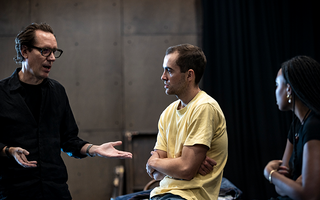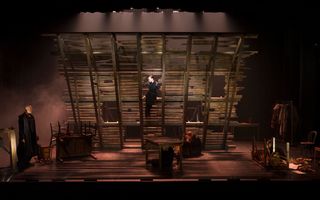 On Stage
On Stage
Is Demetrius still under a spell?
At the end of the play, when Oberon removes the love spell, he only does so from Lysander's eyes. This means that Lysander falls back in love with Hermia, but leaves Demetrius still ‘magically’ in love with Helena. Because we haven't seen the love spell lifted from Demetrius’ eyes, we can assume that his love for Helena is the result of magic. Though many question whether Demetrius does in fact love Helena in his own right, when the lovers awake. Helena appears content yet uncertain when she says “... I have found Demetrius like a jewel, / Mine own, and not my own,” (Act 4, Scene 1) which may lend evidence to the idea that Demetrius is still entranced by Oberon’s spell.
Is A Midsummer Night’s Dream really a comedy?
While A Midsummer Night's Dream is traditionally and very fondly thought of as a love-filled comedy, it has many dark elements. For example, at the opening of the play, Theseus is planning to marry Hippolyta, Queen of the Amazons, who he tells us he “wooed with my sword, and won thy love doing thee injuries.” (Act 1, Scene 1) Hippolyta is presented as the seemingly content soon-to-be-bride, but has in fact been captured through violence.
There is also a wealth of darker elements in the relationships we see in this play. For example, Helena's love for Demetrius is painful to her and drives her to act in ways that demean herself and her own value. “I am your spaniel,” she tells him, “and the more you beat me, I will fawn on you.” (Act 2, Scene 1) Demetrius, in response, threatens Helena that if she doesn't leave him alone he will "do thee mischief in the wood.” (Act 2, Scene 1) These scenes are often played for, and received with, humour, though they betray the play's darker, sometimes violent undertones.
Who is the ‘changeling boy’?
There is much controversy surrounding the Indian "changeling boy” who is the original source of Titania and Oberon's quarrel in the play - both characters want the boy as their own, for different reasons. There is some confusion and contention surrounding where the boy came from and who has ‘ownership’ of him. Titania tells a story about how the boy's mother was a votaress and very dear to her. When the woman died, Titania decided to look after him and protect the child. Puck, on the other hand, reports that Titania has stolen the child "from an Indian King”, while Oberon seems entirely intent on having the child as his "henchman.” It is also unclear whether Oberon's anger comes more from his desire to have ownership of the boy or the fact that Titania has been spending so much time with the child.
All motives appear to be based in the ongoing power struggles between Oberon and Titania, and despite being the instigator of the action of the play, at the end of the play once Oberon ends the spell on Titania, the boy is not mentioned again.










